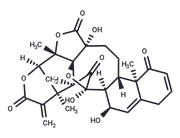| Name | Physalin B |
| Description | Physalin B is one of the major active compounds from the Solanaceae family of plants and has a wide range of biological activities for the treatment of inflammatory eczema and herpes, among other diseases.Physalin B ameliorates lipopolysaccharide-induced inflammatory response due to acute lung injury by inhibiting NF-κB and NLRP3 through activation of the PI3K/Akt pathway.Physalin B inhibits PDGF-BB-induced VSMC proliferation and migration and phenotypic transformation through activation of the Nrf2 pathway. Physalin B inhibits PDGF-BB-induced VSMC proliferation, migration and phenotypic transformation through activation of the Nrf2 pathway.Physalin B exerts antitumor activity by inhibiting LAP2α-HDAC1-mediated deacetylation of glioma-associated oncogene 1 and hepatic stellate cell activation. |
| In vitro | Physalin B inhibited the viability of HCT116 cells with an IC50 value of 1.35 μmol/L. Treatment of the cells with physalin B (2.5-10 μmol/L) induced apoptosis and the cleavage of PARP and caspase-3. Meanwhile, physalin B treatment induced autophagosome formation, and accumulation of LC3-II and p62, but decreased Beclin 1 protein level. Marked changes of microtubules and F-actin microfilaments were observed in physalin B-treated cells, which led to the blockage of co-localization of autophagosomes and lysosomes. Physalin B treatment dose-dependently increased the phosphorylation of p38, ERK, and JNK in the cells, whereas the p38 inhibitor SB202190, ERK inhibitor U0126, or JNK inhibitor SP600125 could partially reduce physalin B-induced PARP cleavage and p62 accumulation. Moreover, physalin B treatment dose-dependently increased mito-ROS production in the cells, whereas the ROS scavenger NAC could reverse physalin B-induced effects, including incomplete autophagic response, accumulation of ubiquitinated proteins, changes of microtubules and F-actin, activation of p38, ERK and JNK, as well as cell death and apoptosis. Physalin B induces mito-ROS, which not only inhibits the ubiquitin-proteasome pathway but also induces an incomplete autophagic response in HCT116 cells in vitro.[2] |
| Storage | store at low temperature | Powder: -20°C for 3 years | In solvent: -80°C for 1 year | Shipping with blue ice/Shipping at ambient temperature. |
| Keywords | PI3K | Physalin B | NSC287088 | NSC 287088 | Nrf2 | NOD | NF-κB | NFκB | NF-kB | NFkB | Caspase | Bcl-2 | Apoptosis | Antifection | Akt |
| Inhibitors Related | Stavudine | Aceglutamide | Hemin | Tamoxifen | Urea | Hydroxychloroquine | Metronidazole | Ethyl linoleate | Paeonol | Naringin | Alginic acid | Diisononyl phthalate |
| Related Compound Libraries | Anti-Tumor Natural Product Library | Traditional Chinese Medicine Monomer Library | Bioactive Compound Library | Rare Natural Product Library | Selected Plant-Sourced Compound Library | Anti-Inflammatory Traditional Chinese Medicine Compound Library | Antiparasitic Natural Product Library | Natural Product Library for HTS | Anti-Aging Compound Library | Immunology/Inflammation Compound Library | Heat-Clearing and Detoxifying Traditional Chinese Medicine Compound Library | Anti-Cancer Active Compound Library |

 United States
United States






